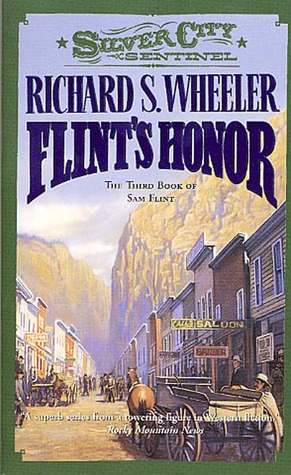In Flint’s Honor, Richard Wheeler has painted a realistic portrait of life in a Colorado mining town, with special emphasis on the importance of newspapers in the civic life of the frontier West.
Sam Flint (a character continuing to develop from two earlier Wheeler novels) is an idealistic newspaperman first drawn to raucous Silver City (a town in a gulch “two miles long and three yards wide”) after reading a vicious account of a young prostitute’s suicide written by Digby Westminster, editor and publisher of the Silver City Democrat. Appalled, Flint resolves to take his printing press to Silver City to start up a rival newspaper, one that will champion—among other things—reforms intended to spread the tax burden more fairly, to the relief of the denizens of the town’s “sporting district” who presently carry it.
In elite academic circles. Westerns are condemned as subliterate pabulum for celebrating self-reliance in a contemporary world of victims, yet they remain—with the exception of the mystery-detective novel—the only really plot-driven fiction still published. Considered this way, the Western has more in common with classic American fiction than with the ideologically trendy and vacuous postmodern American writing prevalent today. I find it odd that Dashiell Hammett’s and Raymond Chandler’s noir classics are now popular in the academy, but Walter van Tilburg Clark’s and Owen Wister’s books are not, except as examples by which to disparage the “myth” of the West. (Wallace Stegner, for instance, thought The Virginian to be at best a “literate horse opera.”)
Sam Flint drives his wagon, loaded with printing press, into Silver City. He reluctantly rents space (there is no other available) in a brothel from Chastity Ford, a stereotypical prostitute with a heart of gold, and begins to publish the Silver City Sentinel with the idea of competing with the corrupt Westminster, a man described as “the brethren of rattlesnakes.”
Wheeler crafts fine sentences full of vivid imagery and detail. He possesses the narrative gift, and his knowledge of the history and culture of the American West is first rate. Wheeler knows how his fictional milieu looks, right down to the saloons dug into the side of a mountain. What mars an otherwise good novel is what mars every Western: The characters are usually no more than the cliched cardboard cutouts, their lives reeking of melodrama, that populate a thousand Hollywood Westerns. The novelistic Western is often a cinematic parody.
Flint struggles against the odds to get his paper off the ground. He has to contend with the disruptive machinations of Westminster, who has locked up the ad market and who editorializes relentlessly against the new “Bawdyhouse Bugle.” And Flint takes on the powers-that-be, the slimy Balthazars—Achilles and his son Hamlin—the owners of the Silver Queen, the mine that made the town. Flint’s crusade for better wages and working conditions for miners, and his publishing ads from other mines in Colorado that offer such, rocks Silver City’s municipal boat. He also makes an enemy of Sheriff Drew Poindexter, the hackneyed corrupt lawman who takes his orders from the moneyed interests and persecutes those not handy with a bribe.
Chastity Ford takes a liking to the chaste Flint and tries, subtly but continually, to seduce him, offering her services free of charge. Flint—a paragon of moral and civic virtue-as constantly resists her charms. But a mutual respect develops between them, and when he and his hired printer witness her brutal murder at the hands of Hamlin Balthazar, the killing reinforces his determination to clean up Silver City. And so a convoluted, though plausible, plot goes forward.
Wheeler’s knowledge of frontier newspapering is formidable. One has the impression that he could publish a paper using a rotary flatbed press. He is familiar with the laundry list of dirty tricks employed in 19th-century newspaper wars, from beating up rival newsboys to pieing an editor’s type. Familiar in the trade was the “gypsy” or “tramp” printer, usually a semi-learned young man whose itinerant life kept him crisscrossing the West and working for various papers, never knowing where his next dollar or drink was coming from. In Flint’s Honor, the role is played by Jude Napolean. As Flint and Napolean (“the bantam printer”) wage their newspaper war, they employ all the tricks available to intelligent and desperate underdogs—including printing the Sentinel in a neighboring town when the Balthazars seize the press in lieu of rent—in a thinking-on-their-feet enterprise that drives the book to its conclusion.
While returning from their press, Flint and Napolean are waylaid by the fugitive Hamlin Balthazar, who seeks to dispose of the two witnesses to his murderous act. But they gain the upper hand and deliver Balthazar to a chastened Sheriff Poindexter (who foresees that Flint’s dogged Sentinel will eventually prevail], Digby Westminster-losing his subscribers and ad revenue to Flint—steals away in the middle of the night, leaving the Sentinel Silver City’s sole paper. At book’s end, Flint sets up his press in a new location and hires as an assistant Livia Bridge—one of his few initial supporters—who we are led to believe will be Flint’s future wife. Jude Napolean moves on to the next paper, leaving Flint to muse that, “Whoever Jude Napolean was, he seemed a miracle . . . Now he [Flint] believed in miracles . . . “
Flint’s Honor suffers from the melodrama of even the best Westerns. But it is so well written, and has such a first-rate plot, that in the end it is a novel not only for connoisseurs of the Western but of the novel as a literary form.
[Flint’s Honor, by Richard S. Wheeler (New York: Forge Books) 320 pp., $23.95]

Leave a Reply